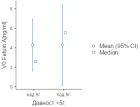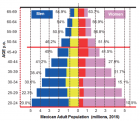Abstract
Research Article
Lifestyle Diseases and the Hair Growth Cycle: A multidisciplinary approach using Nourkrin® with Marilex®, a proteoglycan replacement therapy, for anagen induction and maintenance
Thom E* and Thom EW
Published: 08 December, 2017 | Volume 1 - Issue 1 | Pages: 006-011
Multiple studies have investigated the relationship between androgenetic alopecia and cardiovascular disease, including studies that have identified elevated rates of cardiovascular disease in patients with vertex hair loss, vertex and frontal hair loss, early onset hair loss and rapidly progressive hair loss. In addition, increased risks for hypertension, excess weight, abnormal lipids, insulin resistance, carotid atheromatosis and death from diabetes or heart disease have been reported in this population. Studies investigating an association between androgenetic alopecia and metabolic syndrome have yielded conflicting findings. Distinct guidelines for the detection and prevention of cardiovascular disease in individuals with androgenetic alopecia have not been established. In addition to the traditional risk factors for developing cardiovascular disease, included in the definition of the metabolic syndrome, several skin diseases have recently been shown to be markers of conditions relating to the patient’s overall health. Physicians should be aware of the possible connection between relatively frequent skin diseases, such as psoriasis and hair growth disruptions, including androgenetic alopecia and female pattern hair loss and cardiovascular disease. This review is concentrated on the association between insulin resistance, type 2 diabetes, abdominal fat, cardiovascular disease and hair growth disruptions as an early indicator of these underlying conditions. We have investigated the importance of robust primary clinical treatment measures to address the manifestation of hair loss due to a disruption caused by metabolic syndrome as an effective means to alleviate further stress induced hair loss, which can exacerbate the underlying cause.
Read Full Article HTML DOI: 10.29328/journal.adr.1001002 Cite this Article Read Full Article PDF
Keywords:
Androgenetic alopecia; Risk factor; Cardiovascular disease; Metabolic syndrome; Diabetes; Proteoglycan replacement therapy
References
- Price VH. Treatment of hair loss. N Engl J Med. 1999; 341: 964-973. Ref.: https://goo.gl/fZc4nT
- Paus R, Cotsarelis G. The biology of the hair follicles. N Engl J Med. 1999; 341: 491-497. Ref.: https://goo.gl/r27k4W
- Ellis J, Sinclair R, Harrap SB. Androgenetic alopecia: pathogenesis and potential for therapy. Expert Rev Mol Med. 2002; 4: 1-11. Ref.: https://goo.gl/2wGv1K
- Gan DC, Sinclair RD. Prevalence of male and female pattern in Maryborough. J Investig Dermatol Symp Proc. 2005; 10: 184-189. Ref.: https://goo.gl/kCjePF
- Donovan J, Goldstein BG, Goldstein O. Androgentic alopecia in men: Pathogenesis , clinical features, and diagnosis.
- Setty LR. Hair patterns of scalp of white and Negro males. Am J Phys Anthropol. 1970; 33: 49-55. Ref.: https://goo.gl/fww2zJ
- Paik JH, Yoon JB, Sim WY, et al. The prevalence nd types of androgenetic alopecia in Korean men and women. Br J Dermatol. 2001; 145: 95-99. Ref.: https://goo.gl/shkoWZ
- Küster W, Happle R.The inheritance of common baldness; two B or not two B? J m Acd Dermtol. 1984; 11: 921-926. Ref.: https://goo.gl/ebGqRQ
- Ellis JA, Stebbing M, Harrap SB. Genetic analysis of male pattern baldness and the alpha-reductase genes. J Invest Dermatol. 1998; 110: 849-853. Ref.: https://goo.gl/D42hA1
- Birch MP, Messenger AG. Genetic factors predispose to balding and non-balding in men. Eur J Dermatol. 2001; 11: 309-314. Ref.: https://goo.gl/bztYtc
- Lopez-Candales A. Metabolic syndrome X: Comprehensive review of the pathophysiology and recommended therapy. J Med. 2001; 32: 283-300. Ref.: https://goo.gl/2FZJMN
- Su LH, Chen LS, Lin SC, Chen HH. Association of androgenetic alopecia with mortality from diabetes mellitus and heart disease. JAMA Dermatol. 2013; 149: 601-606. Ref.: https://goo.gl/f5DRRW
- Arias-Santiago S, Gutiérrez-Salmerón MT, Castellote-Caballero L, Buendía-Eisman A, Naranjo-Sintes R. Androgenetic alopecia and cardiovascular risk factors in men and women: A comparative study. J Am Acad Dermatol. 2010; 63: 420-429. Ref.: https://goo.gl/g9fypd
- Ahouansou S, Le Toumelin P, Crickx B, Descamps V. Association of androgenetic alopecia and hypertension. Eur J Dermatol. 2007; 17: 220-222. Ref.: https://goo.gl/gh5TWG
- Hirsso P, Rajala U, Hiltunen L, Jokelainen J, Keinänen-Kiukaanniemi S, et al. Obesity and low-grade inflammation among young Finnish men with early-onset alopecia. Dermatology. 2007; 214: 125-129. Ref.: https://goo.gl/HjPwGE
- Su LH, Chen TH. Association of androgenetic alopecia with metabolic syndrome in men: A community-based survey. Br J Dermatol. 2010; 163: 371-377. Ref.: https://goo.gl/bTbCKU
- Yi SM, Son SW, Lee KG, Kim SH, Lee SK, et al. Gender-specific association of androgenetic alopecia with metabolic syndrome in a middle-aged Korean population. Br J Dermatol. 2012; 167: 306-313. Ref.: https://goo.gl/nwM7Fn
- Hirsso P, Laakso M, Matilainen V, Hiltunen L, Rajala U, et al. Association of insulin resistance linked diseases and hair loss in elderly men. Finnish population-based study. Cent Eur J Public Health. 2006; 14: 78-81. Ref.: https://goo.gl/Qim8Ch
- Arias-Santiago S, Gutiérrez-Salmerón MT, Castellote-Caballero L, Buendía-Eisman A, Naranjo-Sintes R. Androgenetic alopecia and cardiovascular risk factors in men and women: A comparative study. J Am Acad Dermatol. 2010; 63: 420-429. Ref.: https://goo.gl/EYCtqC
- Arias-Santiago S, Gutiérrez-Salmerón MT, Castellote-Caballero L, Buendía-Eisman A, Naranjo-Sintes R. Male androgenetic alopecia and cardiovascular risk factors: A case-control study. Actas Dermosifiliogr. 2010; 101: 248-256. Ref.: https://goo.gl/7nwcVx
- Lotufo PA, Chae CU, Ajani UA, Hennekens CH, Manson JE. Male pattern baldness and coronary heart disease: The Physicians’ Health Study. Arch Intern Med. 2000; 160: 165-171. Ref.: https://goo.gl/85X7xY
- Napolitano M, Megna M, Monfrecola G. Insulin resistance and skin diseases. ScientificWorldJournal. 2015: 2015: 479354. Ref.: https://goo.gl/i2RrBi
- Padi T, Garima. Metabolic Syndrom and Skin: Psoriasis and Beyond. Indian J Dermatol. 2013; 58: 299-305. Ref.: https://goo.gl/uLgehC
- Lønnberg AS, Skov, Skytthe A, Kyvik KO, Pedersen OB, et al. Association of psoriasis with the risk for type 2 diabetes mellitus and obesity. JAMA Dermatol. 2016; 152: 761-767. Ref.: https://goo.gl/8RsDdY
- Gelfand JM. Psoriasis,Type 2 diabetes mellitus, and obesity. Weighing the evidence. JAMA Dermatol. 2016; 152: 753-754. Ref.: https://goo.gl/FDhz1C
- Thom E. Stress and the Hair Growth Cycle: Cortisol-Induced Hair Growth Disruption. J Drugs Dermatol. 2016; 15: 1001-1004. Ref.: https://goo.gl/Ui4aP8
- McElwee KJ, Shapiro J. Promising therapies for treating and/or preventing androgenic alopecia. Skin Therapy Lett. 2012; 17: 1-4. Ref.: https://goo.gl/dsGE5J
- Bernard BA. Advances in Understanding Hair Growth. Version 1. F1000Res. 2016; 5: F1000. Ref.: https://goo.gl/zJiZw7
- Couchman JR. Hair Follicle Proteoglycans. J Invest Dermatol. 1993; 101: 60S-64S. Ref.: https://goo.gl/KvsmrF
- du Cros DL, LeBaron RG, Couchman JR. Association of Versican with Dermal Matrices and its Potential Role in Hair Follicle Development and Cycling. J Invest Dermatol. 1995; 105: 426-431. Ref.: https://goo.gl/LE3nVq
- Kishimoto J, Ehama R, Wu L, Jiang S, Jiang N, et al. Selective activation of the versican promoter by epithelial-mesenchymal interactions during hair follicle development. Proc Natl Acad Sci. USA. 1999; 96: 7336-7341. Ref.: https://goo.gl/Kz88i1
- Kishimoto J, Soma T, Burgeson R, Hibino T. Versican expression by dermal papilla-regenerated hair follicles-a promising tool for hair-regrowth products. Int J Cosm Sci. 2004; 26: 165-166. Ref.: https://goo.gl/nKJWpo
- Soma T, Tajima M, Kishimoto J. Hair cycle-specific expression of versican in human hair follicles. J Dermatol Sci. 2005; 39: 147-154. Ref.: https://goo.gl/tePcg8
- Malgouries S, Thibaut S , Bernard BA. Proteoglycan expression patterns in human hair follicle. Br J Dermatol. 2008; 158: 234-242. Ref.: https://goo.gl/NDXV9a
- Thom E. Nourkrin : Objective and subjective effects and tolerability in persons with hair loss. J Int Med Res. 2008; 34: 514-519. Ref.: https://goo.gl/w2b8wT
- Thom E, Wadstein J, Thom EW, Kingsley DH. Treatment of hair thinning and hair aging with specific lectican and leucine proteoglycans. A review J Appl Cosmetol. 2014; 32: 105-115.
Figures:
Similar Articles
-
Lifestyle Diseases and the Hair Growth Cycle: A multidisciplinary approach using Nourkrin® with Marilex®, a proteoglycan replacement therapy, for anagen induction and maintenanceThom E*,Thom EW. Lifestyle Diseases and the Hair Growth Cycle: A multidisciplinary approach using Nourkrin® with Marilex®, a proteoglycan replacement therapy, for anagen induction and maintenance. . 2017 doi: 10.29328/journal.adr.1001002; 1: 006-011
-
Metabolic Syndrome, Cardiovascular Disease and the Hair Growth Cycle: Addressing hair growth disruptions using Nourkrin® with Marilex® as a proteoglycan replacement therapy: A concise reviewThom E*,Wadstein J,Kingsley DH*,Thom EW . Metabolic Syndrome, Cardiovascular Disease and the Hair Growth Cycle: Addressing hair growth disruptions using Nourkrin® with Marilex® as a proteoglycan replacement therapy: A concise review. . 2018 doi: 10.29328/journal.adr.1001004; 2: 001-007
-
The Combinatory Effects of Zinc Oxide Nanoparticles (ZnO NPs) and Thiamine on Skin of Alloxan-Induced Diabetic Mice; a Stereological and Biochemical StudyRahmat Allah Fatahian Dehkordi*, Sekineh Pasalar, Saied Habibian Dehkordi, Bahnaz Karimi. The Combinatory Effects of Zinc Oxide Nanoparticles (ZnO NPs) and Thiamine on Skin of Alloxan-Induced Diabetic Mice; a Stereological and Biochemical Study. . 2023 doi: 10.29328/journal.adr.1001026; 7: 018-027
-
Epidemioclinical Profile of Inflammatory Ringworm in Children at the Koulikoro Reference Health Centre (Csref)Abdoulaye Kanoute*, Lamissa Cisse, Ramata Fofana. Epidemioclinical Profile of Inflammatory Ringworm in Children at the Koulikoro Reference Health Centre (Csref). . 2024 doi: 10.29328/journal.adr.1001033; 8: 012-014
Recently Viewed
-
Anesthesia Considerations in Scoliosis Surgery - A Clinical CommunicationAnagha Warik,Abinav Sarvesh*. Anesthesia Considerations in Scoliosis Surgery - A Clinical Communication. Int J Clin Anesth Res. 2025: doi: 10.29328/journal.ijcar.1001030; 9: 023-025
-
A Update on Brachytherapy for Cervical Cancer: A ReviewArjun Moorthy,Ayan Issac,Ngoc-Anh Le,Kavin Mutyala*,Bhuvi Mamtani,Shyamal Patel,Lyndsay Willmott. A Update on Brachytherapy for Cervical Cancer: A Review. Clin J Obstet Gynecol. 2025: doi: 10.29328/journal.cjog.1001195; 8: 085-091
-
Misoprostol Usage in the Kingdom of Bahrain: A Retrospective StudyMaryam Alsalem*,Hosni Malas,Gulmeen Raza,Rehab Ismael. Misoprostol Usage in the Kingdom of Bahrain: A Retrospective Study. Clin J Obstet Gynecol. 2025: doi: 10.29328/journal.cjog.1001196; 8: 092-095
-
Fairness at a Cost: The Hidden Dangers of Steroid-Based Skin LightenersManahil Mubeen*,Wania Bint-e-Shahzad,Laiba Azeem,Iflah Noor. Fairness at a Cost: The Hidden Dangers of Steroid-Based Skin Lighteners. J Community Med Health Solut. 2025: doi: 10.29328/journal.jcmhs.1001062; 6: 077-079
-
Excipients and Vehicles in Galenic Practice: Considerations for Neonatology and Pediatrics: An Overview and Results of a Practical ExperienceLuisetto M*,Almukthar N,Edbey K,Hamid GA,Mashori GR,Cabianca L,Ferraioulo A,Fiazza C,Latyshev OY. Excipients and Vehicles in Galenic Practice: Considerations for Neonatology and Pediatrics: An Overview and Results of a Practical Experience. J Adv Pediatr Child Health. 2025: doi: 10.29328/journal.japch.1001075; 8: 023-026
Most Viewed
-
Feasibility study of magnetic sensing for detecting single-neuron action potentialsDenis Tonini,Kai Wu,Renata Saha,Jian-Ping Wang*. Feasibility study of magnetic sensing for detecting single-neuron action potentials. Ann Biomed Sci Eng. 2022 doi: 10.29328/journal.abse.1001018; 6: 019-029
-
Evaluation of In vitro and Ex vivo Models for Studying the Effectiveness of Vaginal Drug Systems in Controlling Microbe Infections: A Systematic ReviewMohammad Hossein Karami*, Majid Abdouss*, Mandana Karami. Evaluation of In vitro and Ex vivo Models for Studying the Effectiveness of Vaginal Drug Systems in Controlling Microbe Infections: A Systematic Review. Clin J Obstet Gynecol. 2023 doi: 10.29328/journal.cjog.1001151; 6: 201-215
-
Causal Link between Human Blood Metabolites and Asthma: An Investigation Using Mendelian RandomizationYong-Qing Zhu, Xiao-Yan Meng, Jing-Hua Yang*. Causal Link between Human Blood Metabolites and Asthma: An Investigation Using Mendelian Randomization. Arch Asthma Allergy Immunol. 2023 doi: 10.29328/journal.aaai.1001032; 7: 012-022
-
An algorithm to safely manage oral food challenge in an office-based setting for children with multiple food allergiesNathalie Cottel,Aïcha Dieme,Véronique Orcel,Yannick Chantran,Mélisande Bourgoin-Heck,Jocelyne Just. An algorithm to safely manage oral food challenge in an office-based setting for children with multiple food allergies. Arch Asthma Allergy Immunol. 2021 doi: 10.29328/journal.aaai.1001027; 5: 030-037
-
Impact of Latex Sensitization on Asthma and Rhinitis Progression: A Study at Abidjan-Cocody University Hospital - Côte d’Ivoire (Progression of Asthma and Rhinitis related to Latex Sensitization)Dasse Sery Romuald*, KL Siransy, N Koffi, RO Yeboah, EK Nguessan, HA Adou, VP Goran-Kouacou, AU Assi, JY Seri, S Moussa, D Oura, CL Memel, H Koya, E Atoukoula. Impact of Latex Sensitization on Asthma and Rhinitis Progression: A Study at Abidjan-Cocody University Hospital - Côte d’Ivoire (Progression of Asthma and Rhinitis related to Latex Sensitization). Arch Asthma Allergy Immunol. 2024 doi: 10.29328/journal.aaai.1001035; 8: 007-012

If you are already a member of our network and need to keep track of any developments regarding a question you have already submitted, click "take me to my Query."



















































































































































